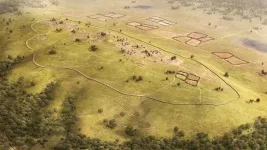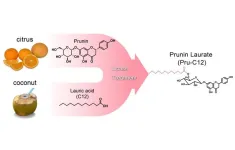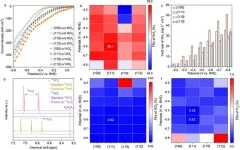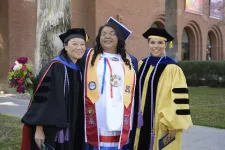(Press-News.org) Imperial College London press release
Under strict embargo until:
Wednesday 28 August 2024
10am UK time/5am Eastern
Study finds limits to storing CO2 underground to combat climate change
Imperial research has found limits to how quickly we can scale up technology to store gigatonnes of carbon dioxide under the Earth’s surface.
Current international scenarios for limiting global warming to less than 1.5 degrees by the end of the century rely on technologies that remove carbon dioxide (CO2) from the Earth’s atmosphere faster than humans release it. This means removing CO2 at a rate of 1-30 gigatonnes per year by 2050.
However, estimates for the speed at which these technologies can be deployed have been highly speculative. Now, findings from a new study led by Imperial College London researchers show that existing projections are unlikely to be feasible at the current rate of growth.
The study found that it might be possible by 2050 to store up to 16 gigatonnes of CO2 underground each year. However, reaching this target would require a huge increase in storage capacity and scaling over the coming decades, which is not anticipated given the current pace of investment, development and deployment.
With the UK Government aiming to position Britain as a clean energy superpower and scale up and invest in carbon capture and storage, the study underscores the importance of aligning ambitious initiatives with realistic objectives for how quickly CO2 can be safely stored underground.
The results are published today in Nature Communications.
Realistic goals
The team from Imperial’s Department of Earth Science and Engineering created models showing how quickly carbon storage systems can be developed and deployed, accounting for the availability of suitable geology, and technical and economic limitations to growth.
While the results suggest it is possible to reduce CO2 emissions at a huge scale, they also suggest that the path to achieving this and the contribution from key regions might differ from what current models project, including those from Intergovernmental Panel on Climate Change (IPCC) reports.
Lead author Yuting Zhang, from Imperial’s Department of Earth Science and Engineering, said: “There are many factors at play in these projections, including the speed at which reservoirs can be filled as well as other geological, geographical, economic, technological, and political issues. However, more accurate models like the ones we have developed will help us understand how uncertainty in storage capacity, variations in institutional capacity across regions, and limitations to development might affect climate plans and targets set by policymakers.”
Co-author Dr Samuel Krevor, also from Imperial’s Department of Earth Science and Engineering, said: “Although storing between six to 16 gigatonnes of CO2 per year to tackle climate change is technically possible, these high projections are much more uncertain than lower ones. This is because there are no existing plans from governments or international agreements to support such a large-scale effort.
“However, it’s important to keep in mind that five gigatonnes of carbon going into the ground is still a major contribution to climate change mitigation. Our models provide the tools to update current projections with realistic goals for how and where carbon storage should be developed in the next few decades.”
Existing projections unlikely to be feasible
In their analysis, the researchers found that the IPCC included results from integrated assessment models (IAMs) – tools combining different sources of information to predict how carbon storage methods can impact our climate and economy – that often overestimate how much CO2 can be stored underground.
In particular, the analysis suggests that projections from IPCC reports for Asian countries including China, Indonesia and South Korea, where current development is low, assumed unrealistic rates of deployment – which means existing projections are unlikely and unreliable.
Co-author Professor Christopher Jackson, also from Imperial’s Department of Earth Science and Engineering, said: “While integrated assessment models play an important role in helping climate policymakers make decisions, some of the assumptions they make when it comes to storing large amounts of carbon underground appear unrealistic.”
Global benchmark
The team’s calculations suggest that a more realistic global benchmark is in the range of 5-6 gigatonnes of storage per year by 2050. This estimate aligns with how existing, similar technologies have been scaled up over time.
Their modelling approach uses growth patterns observed in real-world data from different industries, including mining and renewable energy. By looking at how these industries have grown in the past, and combining existing amounts of stored CO2 with a flexible framework to explore different scenarios, the new approach offers a reliable way to make attainable, long-term projections for underground CO2 storage and could be a valuable tool for policymakers.
Dr Krevor said: “Our study is the first to apply growth patterns from established industries to CO2 storage. Existing predictions rely on speculative assumptions, but by using historical data and trends from other sectors within the industry, our new model offers a more realistic and practical approach for predicting how quickly carbon storage can be scaled up – helping us set more attainable targets.”
This study was funded by Engineering & Physical Sciences Research Council (EPSRC, part of UK Research and Innovation, UKRI) and the Royal Academy of Engineering.
For more information contact:
Caroline Brogan
Imperial College London
caroline.brogan@imperial.ac.uk
+44(0)20 7594 3415
+44(0)7745 650 147
Out of hours press officer mobile: +44 (0)7803 886248
Notes to Editors:
“The feasibility of reaching gigatonne scale CO2 storage by mid-century” by Zhang et al., published 28 August 2024 in Nature Communications.
To download early embargoed version of paper see: https://imperialcollegelondon.box.com/s/bwm7e4s2fvkip938h2d779cp0vmnuorn
About Imperial College London
We are Imperial – a world-leading university for science, technology, engineering, medicine and business (STEMB), where scientific imagination leads to world-changing impact.
As a global top ten university in London, we use science to try to understand more of the universe and improve the lives of more people in it. Across our nine campuses and throughout our Imperial Global network, our 22,000 students, 8,000 staff, and partners work together on scientific discovery, innovation and entrepreneurship. Their work navigates some of the world’s toughest challenges in global health, climate change, AI, business leadership and more.
Founded in 1907, Imperial’s future builds on a distinguished past, having pioneered penicillin, holography and fibre optics. Today, Imperial combines exceptional teaching, world-class facilities and a habit of interdisciplinary practice to unlock scientific imagination.
END
Study finds limits to storing CO2 underground to combat climate change
2024-08-28
ELSE PRESS RELEASES FROM THIS DATE:
Pain identified as dominant symptom in long Covid
2024-08-28
Pain may be the most prevalent and severe symptom reported by individuals with long Covid, according to a new study led by UCL (University College London) researchers.
The study, published in JRSM Open, analysed data from over 1,000 people in England and Wales who logged their symptoms on an app between November 2020 and March 2022.
Pain, including headache, joint pain and stomach pain, was the most common symptom, reported by 26.5% of participants.
The other most common symptoms were neuropsychological ...
What role did fear play in Europe's population growth?
2024-08-28
[Vienna, August 26 2024] – Since the end of the last Ice Age, growth of human population was far from uniform, marked instead by periods of rapid expansion followed by sharp declines. The reasons behind these fluctuations remain only partially understood. Previous research by CSH scientists Peter Turchin, Daniel Kondor, and an international team of collaborators, demonstrated that social conflicts, rather than – or in addition to – environmental factors, could have significantly impacted these patterns. Now, they add another piece to the puzzle.
Wars and conflicts not only cause direct casualties but also create an atmosphere of distress ...
Shot of confidence: Building trust in vaccination programs
2024-08-28
A new paper in the Journal of Public Health, published by Oxford University Press, finds that highlighting the harms of not getting vaccinated is a more effective message than emphasizing the benefits of vaccination for individual patients or the benefits to public health.
Vaccination remains the most economical and effective public health strategy for reducing morbidity and mortality. But some vaccines, such as those for flu, pneumonia and HPV, are given voluntarily. Often due to misinformation or ignorance many people are reluctant to get vaccinated for various diseases (or to vaccinate their children). For years researchers have been investigating various strategies ...
Protect your teeth with fruit: antimicrobial effects found in biomass compounds
2024-08-28
Periodontal disease is an inflammatory disease caused by a periodontal pathogenic bacteria infection that affects oral and internal health. Good oral care is essential for prevention, but most over-the-counter oral hygiene products are disinfectants that can be highly irritating. This makes them unsuitable for use by young children and the elderly, who are susceptible to periodontal disease.
To find an antibacterial that is easy to use and effective in preventing periodontal disease at all ages, Professor Shigeki Kamitani of Osaka Metropolitan University’s Graduate School of Human Life and Ecology led a research team in verifying the antibacterial effect of seven ...
AI tools like ChatGPT popular among students who struggle with concentration and attention
2024-08-28
Since their release, AI tools like ChatGPT have had a huge impact on content creation. In schools and universities, a debate about whether these tools should be allowed or prohibited is ongoing.
Now, researchers in Sweden have investigated the relationship between adolescents’ EF and their use and perceived usefulness of generative AI chatbots for schoolwork. They published their results in Frontiers in Artificial Intelligence.
“Students with more EF challenges found these tools particularly useful, especially for completing assignments,” said Johan Klarin, a school psychologist and research assistant at the Department of Psychology ...
Insights into spinel cobalt oxides may lead to efficient ammonia synthesis
2024-08-28
Researchers have made a significant breakthrough in the development of catalysts for the electrochemical nitrate reduction reaction (eNO₃RR) to ammonia, a process that has broad implications for sustainable energy, agriculture, and industrial applications.
Ammonia, a critical component in global food production, also holds promise as a zero-carbon fuel due to its high energy density, clean combustion products, and established infrastructure for storage and transportation. However, the current method of producing ...
U of A College of Nursing receives $1.6M grant to support Indigenous students
2024-08-28
Indigenous students pursuing nursing careers at the University of Arizona College of Nursing will benefit from additional financial support thanks to a $1.6 million grant from the U.S. Department of Health and Human Services’ Indian Health Service.
The grant will fund the successful Indians in Nursing: Career Advancement and Transition Scholars, or INCATS, program for another five years. The program provides Indigenous students at the U of A College of Nursing with financial support for tuition, fees and a living stipend.
Additionally, the grant provides resources for dedicated time and personnel to partner with tribal ...
Moths may use disco gene to regulate day/night cycles
2024-08-28
How does one species become two? If you’re a biologist, that’s a loaded question. The consensus is that, in most cases, the process of speciation occurs when individuals from a single population become geographically isolated. If they remain separate long enough, they lose the ability to interbreed.
A new study published in the journal Proceedings of the Royal Society B: Biological Sciences demonstrates what happens when a less common form of speciation occurs. Rather than being separated by a physical barrier, such as a mountain range or an ocean, members of a species can become ...
Henna secures $30,000 from PSU’s University Venture Development Fund to enhance AI fairness & safety
2024-08-28
UVDF Funding, Henna
Henna Secures $30,000 from PSU’s University Venture Development Fund to Enhance AI Fairness & Safety
Portland, OR – August 13, 2024 – Henna, a startup with deep ties to Portland State University (PSU), has successfully secured $30,000 in funding from the University Venture Development Fund (UVDF). This grant will support Henna's mission to make AI adoption fairer and safer.
Henna was founded earlier this year by Arsh Haque (they/them), Chair of the Diversity, Equity, & Inclusion ...
Heriot-Watt University breaks ground on new £2.5M Optical Ground Station
2024-08-28
Work has started on a new Quantum Communications Hub Optical Ground Station (HOGS), a state-of-the-art telescope which is being built on Heriot-Watt University’s Research Park.
The new facility will demonstrate and test satellite quantum secure communications, maintaining and growing the UK’s strength in the field of quantum technologies. It is scheduled to be fully operational by late Autumn [2024].
As well as helping to tackle future cyberattacks by researching methods to send secure transmissions via satellites, it will unlock new research on space environmentalism alongside innovative R&D activities for future laser communication ...





